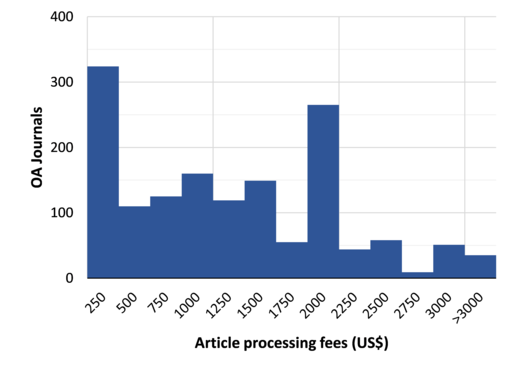Article Processing Charges (APC)
Article Processing Charges and Publication Fees
An article processing charge (APC) is a fee that publishers charge authors to publish an article open access. This fee is sometimes called an Article Processing Fee or Open Access Publication Fee.

We know that APC fees can be a significant challenge for researchers looking to publish their research openly, but we cannot support paying these fees for a few different reasons:
- The Library budget does not currently have funding to cover individual article processing charges
- The Library is already paying for access to these journals in many cases, so if the Library paid APCs as well, we'd be paying some journal twice, once for access and once for each publication. Learn more about this publisher behavior known as double dipping
- In most cases, paying for APCs does not get us closer to open access structurally
However, the Library does support open access publishing in other ways. When possible, the Library enters OA agreements with publishers. With these agreements, the Library does not pay individual APC fees or APC fees for specific articles. The Library pays one amount as part of the agreement, which in turn offers unlimited OA publishing. Learn more about OA agreements on the agreements page in this guide or by visiting our Agreements and Discounts webpage.
Learn more:
Pinfield, S., Salter, J. and Bath, P.A. (2016) The 'total cost of publication' in a hybrid open-access environment: Institutional approaches to funding journal article-processing charges in combination with subscriptions. Journal of the Association for Information Science and Technology, 67 (7). pp. 1751-1766. https://doi.org/10.1002/asi.23446
Thomas Shafee, CC BY 4.0, via Wikimedia Commons
APC Funding
Finding APC Support
Researchers often pursue funding for OA through:
- Research grants
- Their academic departments
- The UD Research Office also has information about funding opportunities
There are also ways of making research publicly accessible that do not require any fees. This includes using scholarly communication tools like Open policy finder to determine journal-sharing policies. Open policy finder compiles and summarizes journal policies, empowering authors to understand what versions of their work they can freely share (i.e., original submission, peer-reviewed version, publisher's version) and in what locations they can share that work (ArXiv, UDSpace, disciplinary repositories, etc.). Researchers can often share specific versions of their work openly, for free, in particular locations. This practice is known as self-archiving or green open access. Learn more about green open access and using Open policy finder.
Learn more:
Explore our Open Access agreements and APC discounts. You can also use the DOAJ: Directory of Open Access Journals or Open Policy Finder to find OA journals with no APC charges or journals that allow sharing the final published version of your work in the institutional repository.